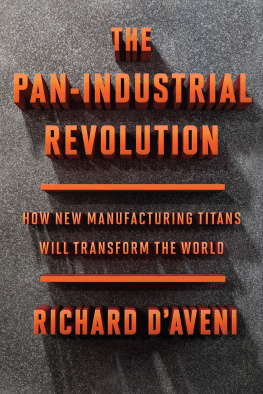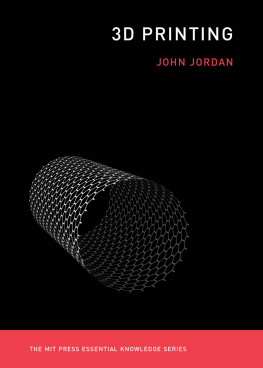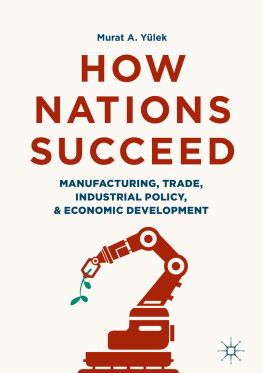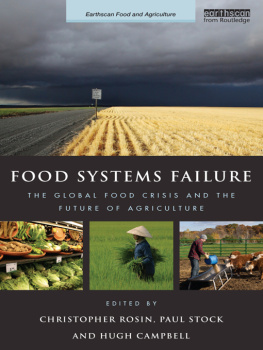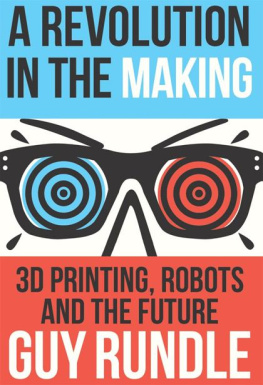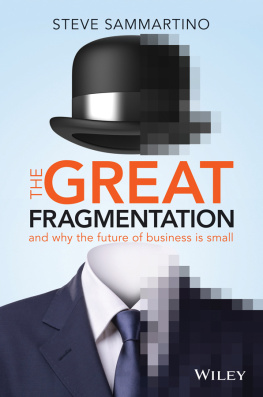3D printing has become emblematic for deep-seated, ambivalent, and strange changes in our societies. Increasingly accessible, and increasingly powerful, it is unclear whose digital fabrications will be served by this potentially ubiquitous technology. Will it be manufacturers, hackers, makers, the military, peer-producers, or entirely new social figures? And what about relations between capital, labour, consumption and environment? Birtchnell and Urry provide a clear-sighted and measured analysis into these issues. Drawing upon the historical, geographic and social relations shaping the development of this technology, their book navigates some of the futures open to us, and makes clear the social choices involved right now.
Adrian Smith,Professor of Technology and Society,
University of Sussex, UK
A NEW INDUSTRIAL FUTURE?
A New Industrial Future? examines whether a further industrial revolution is taking place around the world. In this compelling book Birtchnell and Urry examine such a new possible future involving the mass adoption of 3D printing. The locating of 3D printers in homes, offices, stores and workshops would disrupt existing systems and pose novel challenges for incumbents. The book drawing upon expert interviews, scenario workshops and various case studies assesses the potential future of global manufacturing, freight transport, world trade and land use. It offers the first book-length social scientific analysis of the character and impacts of a new system of manufacturing that is in formation. The book will be of interest to urban planners, policy makers, social scientists, futurologists, economists, as well as general readers by offering inquiry on this future upheaval in the means of production.
Thomas Birtchnell is a Senior Lecturer in Geography and Sustainable Communities at the University of Wollongong, Australia.
John Urry was Distinguished Professor of Sociology and Co-Director of the Institute for Social Futures, Lancaster University, UK.
ANTINOMIES
Innovations in the Humanities, Social Sciences
and Creative Arts
Series Editors: Anthony Elliott and Jennifer Rutherford
Hawke Research Institute, University of South Australia
This series addresses the importance of innovative contemporary, comparative and conceptual research on the cultural and institutional contradictions of our times and our lives in these times. Antinomies publishes theoretically innovative work that critically examines the ways in which social, cultural, political and aesthetic change is rendered visible in the global age, and that is attentive to novel contradictions arising from global transformations. Books in the series are from authors both well-established and early careers researchers. Authors will be recruited from many, diverse countries but a particular feature of the series will be its strong focus on research from Asia and Australasia. The series addresses the diverse signatures of contemporary global contradictions, and as such seeks to promote novel transdisciplinary understandings in the humanities, social sciences and creative arts.
The Series Editors are especially interested in publishing books in the following areas that fit with the broad remit of the series:
New architectures of subjectivity
Cultural sociology
Reinvention of cities and urban transformations
Digital life and the post-human
Emerging forms of global creative practice
Culture and the aesthetic
Series titles include:
1. The Consequences of Global Disasters
Edited by Anthony Elliott and Eric L. Hsu
2. A New Industrial Future?
3D printing and the reconfiguring of production, distribution, and consumption
Thomas Birtchnell and John Urry
A New Industrial Future?
3D printing and the reconfiguring of production, distribution, and consumption
Thomas Birtchnell and John Urry
First published 2016
by Routledge
2 Park Square, Milton Park, Abingdon, Oxon OX14 4RN
and by Routledge
711 Third Avenue, New York, NY 10017
Routledge is an imprint of the Taylor & Francis Group, an informa business
2016 Thomas Birtchnell and John Urry
The right of Thomas Birtchnell and John Urry to be identified as authors of this work has been asserted in accordance with sections 77 and 78 of the Copyright, Designs and Patents Act 1988.
All rights reserved. No part of this book may be reprinted or reproduced or utilised in any form or by any electronic, mechanical, or other means, now known or hereafter invented, including photocopying and recording, or in any information storage or retrieval system, without permission in writing from the publishers.
Trademark notice: Product or corporate names may be trademarks or registered trademarks, and are used only for identification and explanation without intent to infringe.
British Library Cataloguing-in-Publication Data
A catalogue record for this book is available from the British Library
Library of Congress Cataloging in Publication Data
Names: Birtchnell, Thomas, author. | Urry, John, author.
Title: A new industrial future? : 3D printing and the reconfiguring
of production, distribution, and consumption / by Thomas Birtchnell
and John Urry.
Description: 1 Edition. | New York : Routledge, 2016.
Identifiers: LCCN 2016002023| ISBN 9781138022911 (hardback) ISBN 9781138022928 (pbk.) | ISBN 9781315776798 (ebook)
Subjects: LCSH: Manufacturing industriesTechnological innovations. Printing industryTechnological innovations. | Information technologyEconomic aspects.
Classification: LCC HD9720.5 .B547 2016 | DDC 338/.064dc23
LC record available at https://lccn.loc.gov/2016002023
ISBN: 978-1-138-02291-1 (hbk)
ISBN: 978-1-138-02292-8 (pbk)
ISBN: 978-1-315-77679-8 (ebk)
Typeset in Bembo
by Cenveo Publisher Services
CONTENTS
When I commissioned this book at Routledge for the Antinomies series, I had little idea that A New Industrial Future? would be the last collaborative book that John Urry would write along with his protg and coauthor Thomas Birtchnell. It is interesting that A New Industrial Future?, alongside Johns recent What is the Future?, appear as titles with question marks. This, I would suggest, reflects Johns uncanny ability to raise thorny questions at just the right political time something he did most startlingly with the publication of Offshoring in 2014, anticipating the global significance of financial outsourcing and tax evasion as captured most recently by the Panama Papers leak of 2016. John was a sociological thinker to his core, and it was social critique (of the kind practiced from the Frankfurt School of the 1920s to Zygmunt Bauman in our own time) that he did in spades and to brilliant effect.
John Urrys own brand of social theory took off in the 1980s and 1990s, initially with his collaborations with Scott Lash on labour and capitalism, and subsequently bloomed with full force in the early 2000s with his research on mobilities and globalization. John captured the complex, contradictory ways in which the advent of the global electronic economy is intricately intertwined with movement, fluidity, and the wholesale transformation of transport, travel and tourism. Urrys mobilities paradigm had enormous impact in the UK especially, and in various parts of Europe and Australasia too. Understanding the breadth and depth of life on the move for institutions, organizations, regions, nation-states and indeed global governance was at the core of Johns intellectual project. But so too was the impact of mobilities on professional and personal life, and it was my good fortune to have worked with John on our book


